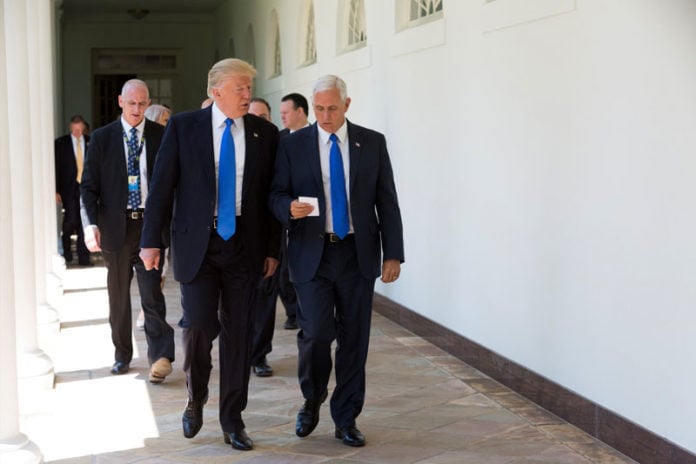Discussions regarding the presidential pardon reigned supreme on almost every Sunday show this past weekend, after President Donald Trump took to twitter to tell the world he “has the complete power” to pardon offenses.
Trump’s attorney, Jay Sekulow, highlighted on ABC’s “This Week” that he and President Trump have not yet spoken about presidential pardons.
“We have not and I continue to not have conversations with the president of the United States about pardons,” said Sekulow.
Sekulow also emphasized that Trump does not and will not have any reason to pardon anyone regarding the Russia probe. “We’re not researching the issue because the issue of pardons is not on the table. There’s nothing to pardon from,” he said.
The latest controversy in the long-running Russia investigation comes as special counsel Robert Mueller’s probe into the alleged Russian interference in the 2016 US presidential elections and also any collusion between the Trump campaign and Moscow, expands.
“While all agree the U. S. President has the complete power to pardon, why think of that when only crime so far is LEAKS against us.FAKE NEWS,” Trump tweeted Saturday.
Last week, The Washington Post reported that Trump’s legal team had begun exploring possibilities regarding President Trump’s powers to pardon those involved in the Russia scandal.
However, Trump’s closest aides have repeatedly insisted that there won’t be a need for pardons, hence, they are off the table. “I think the gist of that leak, basically, or that tweet, I should say, is that he’s not going to pardon anybody,” said the White House’s newly appointed communications director Anthony Scaramucci in a Sunday interview with CBS’s “Face the Nation.”
“He doesn’t need to pardon anybody,” Scaramucci added.
All the talk regarding presidential pardons has led to legal experts regularly argue whether or not President Trump could pardon himself.
Laurence Tribe, a Harvard Law professor, Richard Painter, President George W. Bush’s chief ethics lawyer, and Norman Eisen, Obama’s ethics lawyer, wrote an op-ed for The Washington Post last week. They pressed that the “The Constitution specifically bars the president from using the pardon power to prevent his own impeachment and removal.”
“It adds that any official removed through impeachment remains fully subject to criminal prosecution. That provision would make no sense if the president could pardon himself,” an excerpt from their piece read.
However, on CNN’s “State of the Union” this Sunday, Republican Senator Rand Paul said that Trump probably has the authority to pardon himself.
“I think in all likelihood he does,” he said. “I think that some of this hasn’t been adjudicated.”
But Paul believes that a president pardoning himself or members of his family would create political issues. “I think in a political sphere, I would caution someone to think about pardoning themselves or family members or et cetera,” he said.
Sekulow echoed Senator Paul’s point, noted on Sunday that the dispute regarding presidential pardons had never been settled before and a court will have to judge if the president could pardon himself.
Special counsel Mueller has reportedly expanded the investigation to include various other avenues, including Jared Kushner’s financial transactions and business dealings. Kushner, who is the president’s son in law, also serves as a senior adviser in the White House.
All the chatter regarding pardons has troubled congressmen and lawmakers; who believe it could set the wrong precedent. Democratic Senator Mark Warner (Va.), Senate Intelligence Committee vice chairman, voiced concerns earlier this month that Trump could pardon his aides connected to the Russia probe. The Senate Intelligence Committee is heading the congressional probe into the Trump campaign’s alleged collusion with Moscow.
On ABC’s “This Week” Sunday, Senate Minority Leader Charles Schumer (D-N.Y.) resonated these concerns, advising Trump against granting himself or anyone else connected to the Russia probe, any pardons.
“If he fired [Special Counsel Robert] Mueller or pardoned himself or someone close to him under investigation, it would be one of the greatest, greatest breaking of rule of law, of traditional democratic norms of what our democracy is about,” Schumer said.
“I think it would cause a cataclysm in Washington. I cannot imagine our Republican colleagues, including Ryan and Mitch McConnell, just standing by if he were to do either of those things.”




























